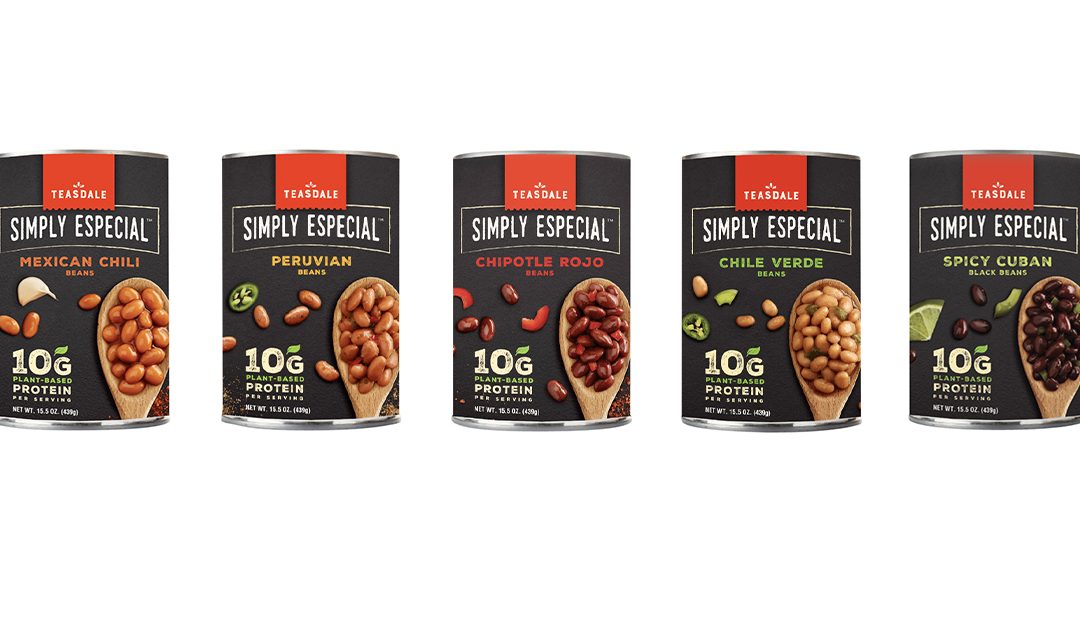For the past seventy years, California based Teasdale Latin Foods has been providing American consumers with a range of Hispanic foods, from tortillas and hominy to hot sauces and seasonings. The company began as a purveyor of canned tomatoes, and their latest launch—a range of canned beans—might sound equally prosaic, were it not for the addition of a very twenty-first century ingredient: pea protein isolate.
The launch of a range of beans featuring this plant based protein is certainly in keeping with one of the year’s top trends, “The Plant Kingdom,” which sees the popularity of plant based products continue to grow. Consumers are increasingly adopting a flexitarian approach to eating, and are looking to incorporate more plants in their diets, including plant based sources of protein.
The new range of beans comprises five flavors: Chile Verde, a blend of navy beans, green bell peppers, lime juice, and jalapeños; Chipotle Rojo, a smoky-sweet mix of red beans, red bell peppers, and spices; Mexican Chili, with pinto beans, garlic, and spices; Peruvian, a South American-inspired blend of Peruano beans, jalapeño peppers, bell peppers, and spices; and Spicy Cuban Black Beans, a combination of black beans, bell peppers, and lime juice. Each 15.5oz can contains 3.5 servings, and each half-cup serving provides 10g of plant based protein, in the form of the aforementioned pea protein isolate. (According to Yvonne Conroy, Teasdale’s head of product innovation, this is about three to four grams more protein than most other canned beans.) A serving also contains between 120 – 130 calories, depending on flavor, and between 320 – 330mg sodium, or 14 percent of the recommended daily value. The beans are also a good source of iron, with a single serving providing 15 percent of the recommended daily intake. The MSRP of $1.69 to $1.89 per can is a little higher than Teasdale’s other canned bean offerings, which typically retail for between $1.29 and $1.49.
 According to a recent NOSH article, Teasdale tested the consumer appeal of numerous health claims, such as improving heart health, before deciding to focus on increased protein content for this latest launch. As Conroy notes in the April press release announcing the new range, “More and more consumers are incorporating plant based proteins into their diets and we plan on being right there to provide them with quality and great flavors they can enjoy.” The main challenge in the development of this new plant based line, Conroy told NOSH, was increasing the protein content without relying on common allergens like soy and wheat.
According to a recent NOSH article, Teasdale tested the consumer appeal of numerous health claims, such as improving heart health, before deciding to focus on increased protein content for this latest launch. As Conroy notes in the April press release announcing the new range, “More and more consumers are incorporating plant based proteins into their diets and we plan on being right there to provide them with quality and great flavors they can enjoy.” The main challenge in the development of this new plant based line, Conroy told NOSH, was increasing the protein content without relying on common allergens like soy and wheat.
Having solved this problem through the use of hypoallergenic pea protein isolate, Teasdale is now keen to capitalize on the popularity of the plant based trend. The company’s website notes that the new range is “packed with 10 grams of plant based protein per serving,” and the addition of plant based protein also features prominently on the can—the large “10g” with a green leaf hovering above it is the first thing that catches the eye. The Teasdale Facebook page also emphasizes the plant-protein component, mentioning “10g of plant based protein” in every post relating to the launch.
Beans are already regarded as a nutritious option—U.S. News calls them “the undervalued superfood”—and the addition of a little pea protein might just make this new range irresistible to health conscious consumers looking to increase their plant intake. According to Teasdale, there has already been a considerable amount of interest in the April launch, with early distribution gains at major retailers nationwide.
All Innova Market Insights material is copyrighted. The terms of use for this resource are contained in our standard Terms and Conditions.









